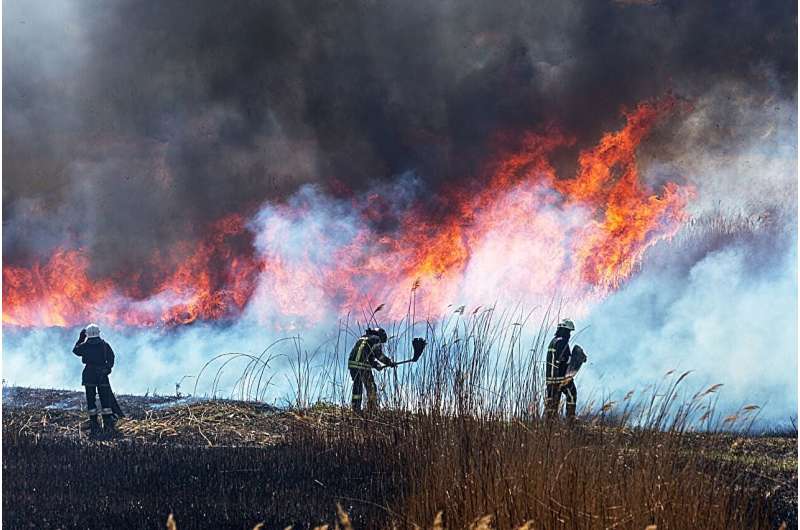This article has been reviewed according to Science X's editorial process and policies. Editors have highlighted the following attributes while ensuring the content's credibility:
fact-checked
reputable news agency
proofread
Wildfire smoke exposure linked with higher dementia risk

The wildfires that are increasing with climate change could harm the future brain health of humanity, a new study suggests.
Wildfire smoke appears to increase people's risk of a dementia diagnosis even more than other types of air pollution, researchers reported at the Alzheimer's Association annual meeting in Philadelphia.
The risk of dementia with wildfire smoke was notably stronger, even with less exposure, than that associated with other sources of air pollution, researchers found.
"With the rising global incidence of wildfires, including in California and the western U.S., exposure to this type of air pollution is an increasing threat to brain health," said Claire Sexton, senior director of scientific programs and outreach at the Alzheimer's Association. "These findings underscore the importance of enacting policies to prevent wildfires and investigating better methods to address them."
Researchers found a 21% increase in the odds of dementia diagnosis for every increase of 1 microgram per cubic meter in levels of particle pollution caused by wildfire smoke, researchers found.
By comparison, other forms of air pollution caused a 3% increased risk in dementia diagnosis for every 3 microgram per cubic meter increase in airborne particulates.
Wildfires, motor vehicles and factories all spew a type of air pollution called fine particulate matter. These solid and liquid particles are 30 times smaller than the width of an average human hair.
For this study, researchers analyzed health records for more than 1.2 million Kaiser Permanente members living in southern California. All the participants were 60 or older between 2009 and 2019, and none had been diagnosed with dementia at the start of the study.
The researchers compared these patients with air quality records gathered by the U.S. Environmental Protection Agency.
"Previous research has found that exposure to [particle pollution] is associated with dementia, but in light of our large, long-term study, it's apparent the risk from exposure due to wildfire smoke is an even bigger concern," said lead researcher Dr. Holly Elser, a neurology resident at the Hospital of the University of Pennsylvania, Philadelphia.
"Air pollution produced by wildfires now accounts for more than 70% of total (particle pollution) exposure on poor air quality days in California," Elser added in an Alzheimer's Association news release. "This is a real problem."
The particle pollution produced by wildfires is produced at higher temperatures, contains a higher concentration of toxic chemicals, and are on average smaller than the particles produced by other sources, Elser said.
"The findings appeared most pronounced among individuals from racially and ethnically minoritized groups and in high poverty areas," said senior researcher Joan Casey, an assistant professor of environmental and occupational health sciences with the University of Washington in Seattle.
"These findings underscore that clinical and health policies seeking to prevent dementia-associated disparities should include efforts to reduce exposure to long-term wildfire and non-wildfire [particle pollution]."
People in a wildfire smoke zone need to keep tabs on the air quality in their area, the researchers said. If particle pollution spikes, they should stay inside with the windows closed, run an air purifier and wear an N95 mask when they go outside.
More information: The Environmental Protection Agency has more on particle pollution.
Copyright © 2024 HealthDay. All rights reserved.

















